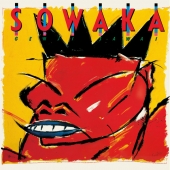
Sawai Genji
Sowaka
Label: Glossy Mistakes
Genre: 80s Wave / Rock / Pop / Punk
Availability
- LP €33.99 Dispatched within 5-10 working days
In 1984, working with Bill Laswell, Michael Beinhorn and Midori Takada would be unlike working with anyone else Genji Sawai had before, pulling him out of the J-jazz experimental scene he was based on. Rather than work off written music, they’d build songs like cooks. Genji might supply the ingredients, perhaps the tonal choices – sax, FM synths, drum machines, and Bill would task himself to do the “cooking”, creating the overall image of the song. It’s the use of imagery to have a conversation with each other, musically, that just felt so different to Genji. Unlike the other musicians who contributed to Sowaka, musicians of impressive, rarefied technique like Midori Takada, Shuichi “Ponta” Murakami, and Kazuhiko Shibayama, notation or sheet music wasn’t a part of Genji’s vocabulary with Bill. With him, drawings were how songs were built from the ether. Whatever image a demo conjured up – that’s where the song had to go.
You hear it on songs like “Hikobae” that predicted the chopped and screwed sound that would revolutionize hip-hop years later. On this track what started with a mental picture, of some kind of tree shoot, metastasizes a vision full of no-wave sax skronk dosed with pointillistic dub affectations. Although, Sowaka wasn’t tied inherently to it’s original meaning – the final utterance from the Buddhist Heart Sūtra – it’s philosophical meaning wasn’t too divorced from the true meaning (or at least, his truest meaning) Genji placed on it here: getting things done. Simply put, all his high-minded ideas wouldn’t have come to fruition unless all involved put some serious work into getting the project over the finish line. In five cracking days the album was put on tape and was then jettisoned off to NYC for Bill to put its final touches.
Moving beyond world music, there was territory to be uncovered that was even more unplaceable. Somewhere, between the mind, body, and spirit, closer to one’s neck and booty, was this music urging you to simply move elsewhere, further, until you’re closer to where Genji’s music would land. Somewhere between history and his story, there’s still room to rewrite our story by absorbing this spectacular music that remains completely, forever, out of time.
